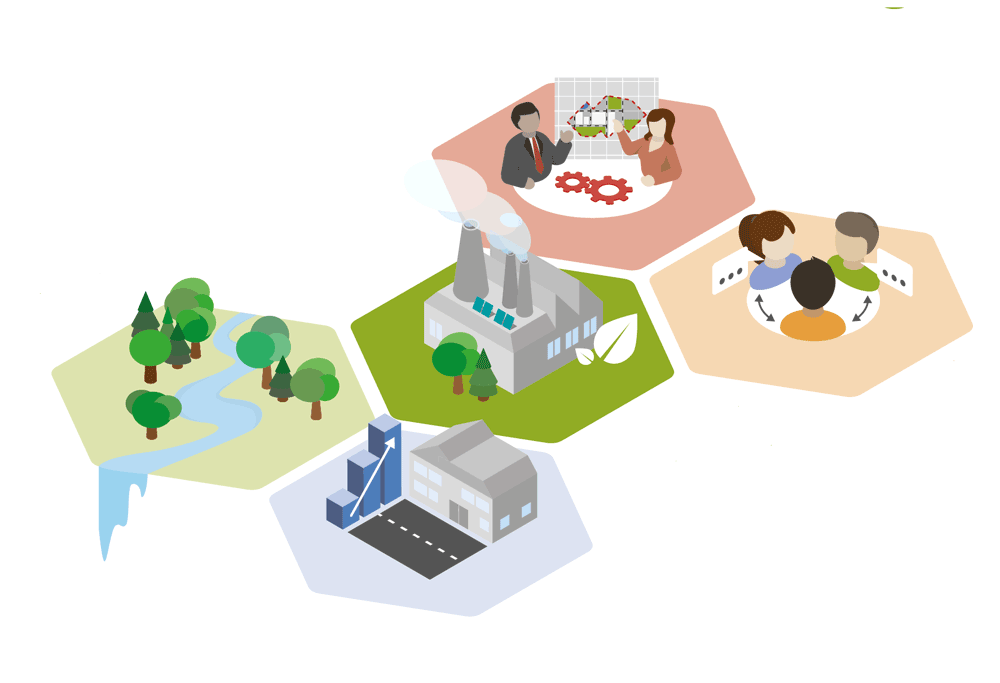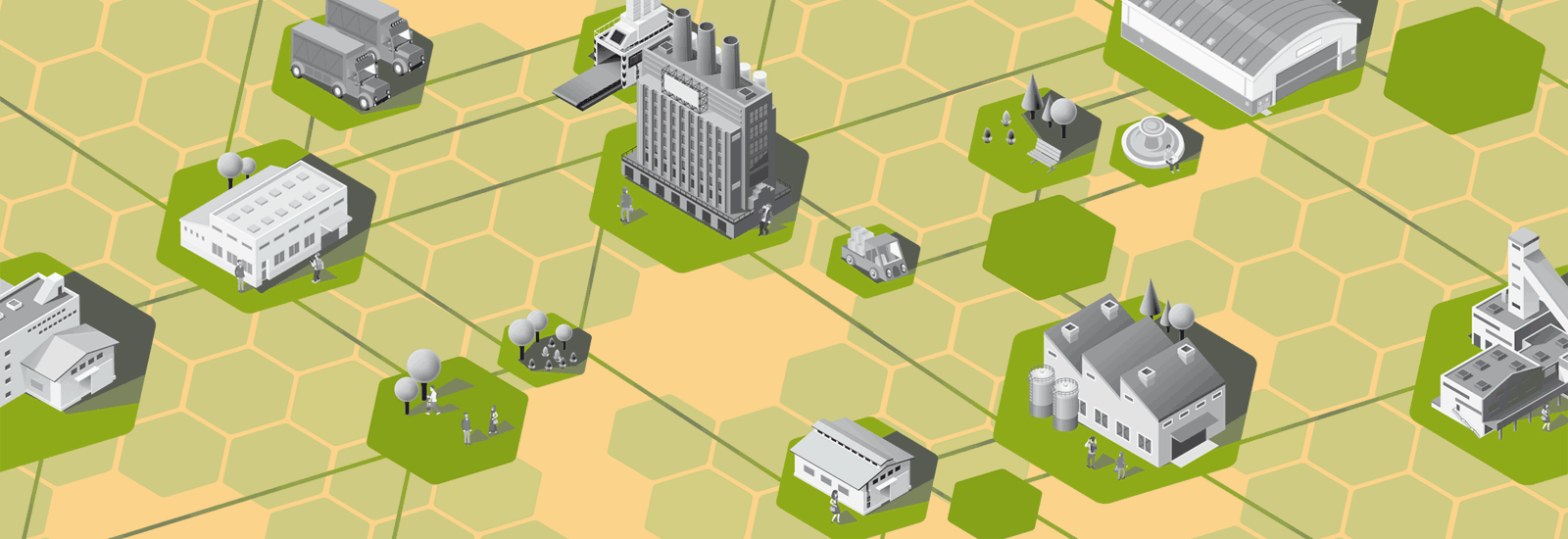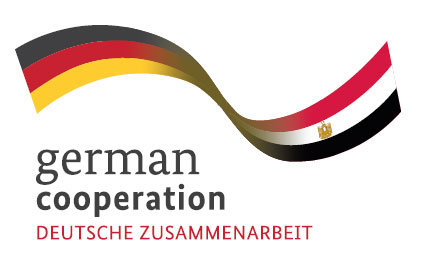The International Conferences on Sustainable Industrial Areas (SIA) bring experts from all over the world together to discuss recent trends, best practices, and future development of SIA. The conferences serve as an international platform for exchanging knowledge about sustainable industrial development of industrial areas worldwide. In the past, there have been similar International SIA Conferences in India, China, Indonesia, Turkey, Mexico, Morocco, Egypt, and Ethiopia.
The 10th conference will be held in Cairo, Egypt, under the title "Strengthening Regional Industrial Competitiveness and Economic Resilience" from 6 to 7 June 2023. Relevant topics are just transition towards carbon neutrality through industrial symbiosis and circular economy approaches as well as private sector development, including access to finance and investment attraction, the creation of green jobs and digital transformation.

The SIA Conference will be organized by the Deutsche Gesellschaft für Internationale Zusammenarbeit (GIZ) under the “Invest for Jobs” brand and as part of implementing the special initiative “Decent Work for a Just Transition” (SI Jobs) Programme on behalf of the German Federal Ministry for Economic Cooperation and Development (BMZ). The conference is jointly organized with the World Bank Group (WBG) and the United Nations Industrial Development Organization (UNIDO) – together with the Egyptian Ministry of Trade & Industry (MTI) and the Industrial Development Authority of Egypt (IDA).
The approach of "Sustainable Industrial Areas (SIA)" promotes sustainable industrial development by balancing environmental, economic, and social aspects.
While industrial areas are a motor of industrialisation and technology development worldwide, they are often criticized as areas of extended resource consumption and environmental pollution. The concept of "Sustainable Industrial Areas (SIA)" of the Deutsche Gesellschaft für Internationale Zusammenarbeit (GIZ) GmbH addresses this criticism by highlighting organizational, environmental, economic and social features as indispensable requirements for industrial parks on their pathway to sustainability. This requires in particular management structures, which focus on resource and energy efficiency, environmental protection and social compatibility.
Thus, for the GIZ the SIA approach represents an important element of its advice to partners in the industrial sector. For many years, projects addressing various aspects of sustainable industrial development and sustainable industrial areas have been carried out by GIZ in many countries and significant knowhow and experiences have been accumulated in the organisation. The representatives of SIA projects and experts involved have formed the GIZ-Working Group on Sustainable Industrial Areas, which, together with its partners worldwide, permanently works on further developing the SIA concept.

GIZ, World Bank Group and the United Nations Industrial Development Organization (UNIDO) have recently partnered to provide further guidance on a broad definition of SIA or Eco-Industrial Parks (EIP) to ensure that they encompass park management, social, environmental, and economic aspects.
The three organizations jointly published the International Framework for Eco-Industrial Parks to provide a common understanding of EIPs with minimum requirements and performance expectations as to how an industrial park can become an EIP. The International Framework for Eco-Industrial Parks will guide policymakers and practitioners on the critical elements that will help both governments and the private sector work together in establishing economically, socially, and environmentally sustainable eco-industrial parks.
Furthermore, the "Practitioner’s Handbook for Eco-Industrial Parks: Implementing the EIP Framework" has been developed jointly by World Bank, UNIDO and GIZ. The EIP Practitioner’s Handbook is a practical, step-by-step guide that takes stakeholders through the entire process of operationalizing the International EIP Framework. The Handbook is intended to help practitioners operationalize the International EIP Framework at the national and /or park level, as well as specific EIP performance requirements set in the Framework.
- Sustainable Industrial Areas act as economic catalysts that provide social and economic infrastructure, build up a favorable business environment, improve competitiveness, generate employment and attract local and foreign investments.
- Circular economy and industrial symbioses are effective approaches aiming at less waste, more value, and create new opportunities and services.
- Transition towards carbon neutrality is not only essential for mitigating climate change, it can be a driver to economic growth and creating thousands green jobs.
- Financing industrial areas is necessary to foster just transition principles to achieve contemporary goals of sustainability.
- Sustainable digitalization is a key driver to achieve economic, social, environmental benefits and business management improvements in industrial areas.
The thematic topics of the conferences represent important Egyptian industrial development goals:
 Circular Economy
Circular Economy
A transition to circular economy is significant to move away from the current linear economic model of take, make, and throw away. This transition is mandatory to reach the environmental goals of the 2030 Agenda for Sustainable Development. It is important to make sure that the transition to a resource efficient and circular economic model will also deliver on social objectives poverty eradication, improved livelihoods and well-being, decent work, and reduced inequalities.
Policymakers should adopt a unified approach that can involve the circular economy transition through the aspects of technology, finance, behaviour, and the ecosystem. When this unified approach is considered, circular business supporters will be capable to offer circular products and services with technologies that can attract needed financing in order to provide products and services that will be appreciated by the consumers.
 Industrial Symbiosis
Industrial Symbiosis
- Resource efficiency, waste exchange, and business matchmaking among value chain actors
- Economic competitiveness, process optimization, cost reduction, and sustainability
- Innovative business models that create sustainable industrial networks from different sectors
- Positive environmental and social impacts and civil society engagement
 Economic Resilience
Economic Resilience
- The ability of an economy, community or region to recover from economic shocks and disruptions.
- Involves building and maintaining diverse and adaptable economic and business mechanisms that can recover and adapt to sever changes through investing in infrastructure, education and workforce development.
- Builds an economy that is sustainable, equitable and able to withstand and adapt to market changes.
 Enabling Transformation Technologies and Methodologies
Enabling Transformation Technologies and Methodologies
- Utilization of renewable energy sources decreases carbon emissions.
- Implementation of energy-efficient technologies and smart grid systems optimize energy consumption and reduce waste.
- Water conservation technologies to minimize water use and reduce the environmental impact of industrial processes.
- Sustainable transportation solutions such as electric vehicles or public transportation can help to reduce traffic and air pollution.
- Sustainable digitalization supports the long-term health and well-being of people.
- Financial resources for infrastructure development, equipment acquisition, research and development help industrial parks operate efficiently, reduce their environmental impact, and contribute to economic development.
Up to 300 participants are expected to attend the conference (with the possibility to participate virtually as well), amongst them representatives from
- Academia
- Government institutions
- International financial institutions
- Industrial development agencies
- Industry and business associations
- Investors and park developers
- National and international experts
- Other private sector actors
Since sustainability is an important issue for GIZ, Egyptian Government and the entire SIA community, the organisers of the conference intend to integrate sustainability aspects into the conference planning and while the conference takes place. In this respect, important features are:
 Minimising Transport
Minimising Transport
- Accommodation is provided at or in walking distance to the conference venue.
- Joint transportation is organised from and to Cairo Airport.
 Reducing Waste Generation
Reducing Waste Generation
- Conference rooms are equipped with color-coded waste bins for waste separation.
- Writing pads provided to the participants are made from recycling paper.
 Motivating Participants
Motivating Participants
- to order vegetarian food for their meals (please mark while registering)
- to sort their waste
- to use few or no plastic bottle for drinks
- to switch off electricity when leaving their hotel rooms
- to save water during showering and toilet use
- to use hotel towels several days
- to use the provided bus shuttle or public transport when moving through the city.






